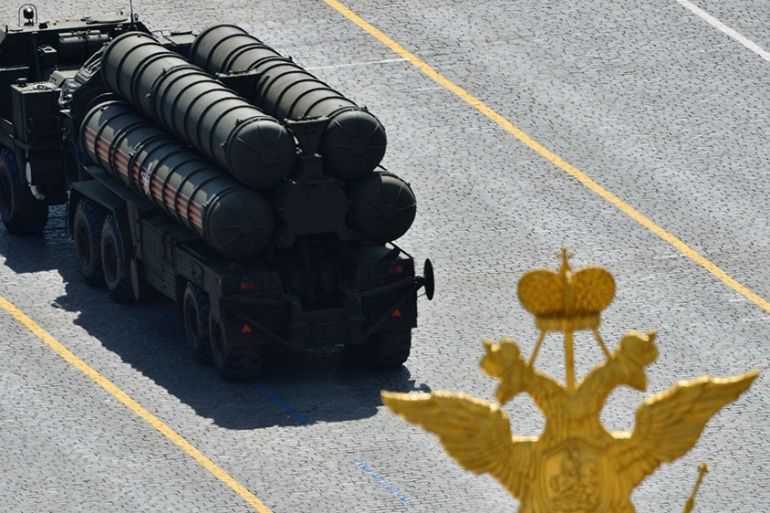Turkey caught between Russian S-400 and US Patriot missiles
NATO nations view Turkey’s purchase of the Russian defence system with suspicion but Ankara is pressing ahead.

Istanbul, Turkey – Amid an ongoing rift between the United States and Turkey over its decision to buy a sophisticated Russian air defence system, Ankara says it is determined to complete the $3.5bn acquisition and activate the S-400s in October.
But Turkey is also leaving the door open to the purchase of advanced Patriot missiles from the US, saying negotiations are still under way on cost, technology transfers, and the delivery period, defence officials said on Wednesday.
Keep reading
list of 4 itemsRare deep-sea squid filmed by scientists
Palestinian life under Israeli occupation: An illustrated guideThis article will be opened in a new browser window
Boeing’s jets turn 70: A timeline of highs, lows and turbulence
NATO-member Turkey has long relied on US Patriot batteries from the alliance for its air defence but has been looking to procure its own system for years.
NATO nations – particularly the US – view Turkey’s purchase of the Russian-made equipment with suspicion, as it is believed to be incompatible with systems relied upon by the alliance.
The US’s stance was recently underlined by Vice President Mike Pence in a speech at the Munich Security Conference.
“We will not stand idly by while NATO allies purchase weapons from our adversaries. We cannot ensure the defence of the West if our allies grow dependent on the East,” said Pence.
Countering threats
Turkey says it needs alternative defences to counter regional threats and can nationalise the Russian system by redesigning its software.
Turkish officials have accused the US of politicising the purchase after divisions have emerged, particularly over the civil war in Syria and Washington’s support for the Kurdish YPG militia in the fight against the Islamic State of Iraq and the Levant (ISIL, ISIS) group.
Turkey considers the YPG – which the US has armed and trained and is its main ally in Syria – as a “terrorist group”.
Murat Aslan, a Turkish defence analyst and former military officer, says the defence arsenals of Baltic and East European states are made up of Russian systems as well as NATO ones, including radar and support mechanisms. He questioned US objections to Turkey’s S-400 purchase.
“Why not? Turkey had started to procure the US air defence system but it was the US side that demanded a very high price, conditionality, and there were concerns over the probable veto by the [US] Congress,” he told Al Jazeera.
Aslan suggested concerns over “interoperability” between the Western and Eastern defence systems were unfounded.
|
|
“The deal with the Russian government does not ban any further patch of software that Turkey can modify, in accordance with national and NATO standards.”
“It is a vital issue not only for NATO, but also for Turkish aviation assets. Hence redesigning the software of the system will completely make S-400 interoperable with the NATO systems,” he said.
Some defence engineers say Turkey could redesign software only for parts that Russia grants access to, and building entirely “indigenous” software to control the S-400s is impossible.
The issue remains highly political and Turkish military and technology officials refused to comment when asked by Al Jazeera.
Patriots too?
A senior US official, speaking to Al Jazeera on condition of anonymity, said the US Congress would not approve a Patriot sales package to Turkey unless it dropped the S-400 deal with Russia, but both sides have been working on alternative solutions.
Asked about Greece – another NATO member that purchased Russia’s S-300 system in the mid-1990s, the American official said as the alliance viewed Russia very differently at that time.
“It had not invaded and seized sovereign territory of its neighbours [at that time],” he said, pointing to Moscow’s military action in Georgia and Ukraine in the last decade.
“We also didn’t have an F-35 [fighter jet] programme under way at the time where the operation of an S-300 system would necessarily call its security into question.”
Aslan said US hegemony in the defence industry was on the decline and Russian air defence systems were more qualified.
“The ultimate purpose of the United States is to have any country, now Turkey, be dependent on US military assets to define what to do or not to do,” he said.